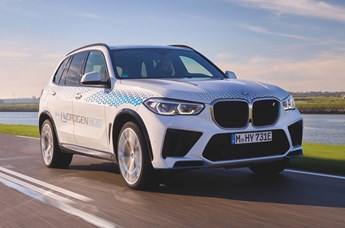We use cookies to ensure that we give you the best experience on our website. If you continue without changing your settings, we will assume that you are happy to receive all cookies on the Business Car website. However, if you would like to, you can change your cookies at any time

The start point for the best source of fleet information |
First drive: BMW iX5 Hydrogen
Date: 14 July 2023 | Author: Martyn Collins

|
|
||||||||||||||||
It seems that electric power is the future fuel of choice for passenger cars. But what about hydrogen? It has been around for longer, but seemed better suited to HGVs than passenger cars, with only Toyota and Hyundai offeringproduction models.
Then there's the refuelling stations to think of, with just a handful of stations dotted around the country - it's not a viable choice at the moment. Although, that's due to change with the announcement of many stations opening across the country by the end of this year.
There will also be more passenger car models too, with BMW being the latest to throw its hat into the ring, following a deal signed last year with Toyota. The first car previewing the technology is a fleet of hand-built X5s (100 to be precise), to see if hydrogen is a viable fuel of the future, and we've been lucky enough to get a go.
Outside, apart from blue highlights, a new front air dam and the latest, intricate 22in alloy wheel design, the X5's chunky silhouette looks unchanged. However, the clever stuff happens underneath. Not one but two carbon-fibre reinforced plastic hydrogen tanks are mostly hidden in this SUV's body structure - though interior space is unchanged compared with the standard ICE version. These can hold almost 6kg of hydrogen at a pressure of 700 bar, which powers up the hydrogen fuel cell, which is situated where normally you'd find the ICE engine.
A chemical reaction then takes place in the fuel cell (supplied by Toyota), turning the hydrogen into electricity, which then fills a power battery powering the fifth generation eDrive motor on the rear axle, equalling total power of 401hp.
BMW claims a range of 313 miles, which is about the same as an EV of the same size would be capable of. However, BMW believes that hydrogen fuel cell technology would be complementary to EV technology. The benefits being swifter refuelling - as we were told the iX5's tanks could be filled from empty in an incredible five minutes.
Filling up is easy too, as we were able to experience this on our drive. The refuelling port is in the same place as the standard car and the nozzle simply clicks into place.
Other hydrogen benefits include no range reduction in cold weather and being better suited to towing.
On the move, if we hadn't been told we were driving a hydrogen-powered car, we would have thought it was just another of BMW's EV SUVs, such as the iX3 or iX, as the feeling is very similar.
Refinement appears to be better than those BMW EVs mentioned; the iX5 interior seems even quieter and despite the massive rims, the ride remained impressively smooth on our mostly urban drive. Cleverer still, is that despite the fact it weighs the same as an X5 PHEV, which is around 2.500kg, you'd struggle to tell this on the move - the steering is precise and there's tight handling with plenty of grip - although the focus here is on comfort rather than involvement.
Considering how well-rounded and finished the iX5 is, it almost seems a shame that it will not become a production reality, as it feels that ready. However, a future production model, that probably wouldn't be an X5, is definitely in the plan for a couple of years' time. If the refuelling infrastructure gets to where it needs to be, a big hydrogen-powered SUV could make a lot of sense for fleet buyers as another option to EV. We look forward to further developments with interest.
BMW iX5 Hydrogen
P11D: N/A
On sale: N/A
Residual value: N/A
Depreciation: N/A
Fuel: N/A
Service, maintenance and repair: N/A
Cost per mile: N/A
Range: 313 miles
CO2 (BIK %): 0g/km (2%)
BIK 20/40% a month: N/A
Luggage capacity: 390 litres
Engine size/power: N/A/401hp
Verdict |
8/10 |
|||
 |
|
 |
|
|











